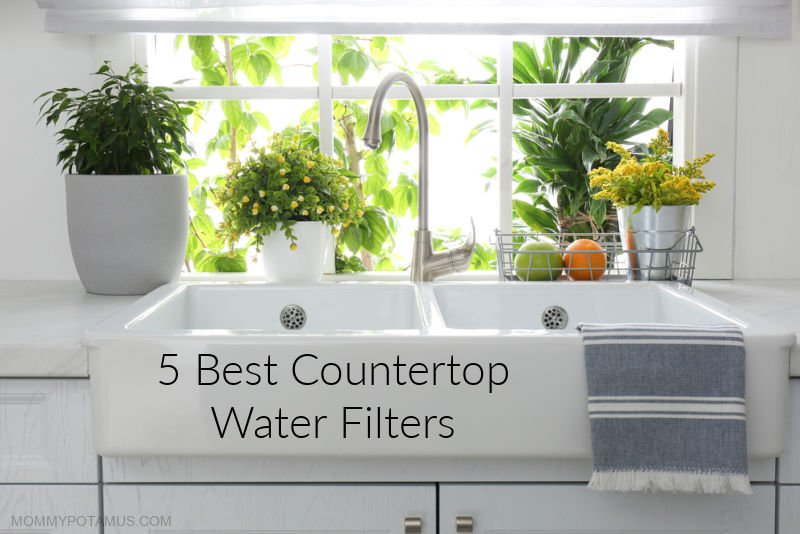
When it comes to the “Stuff of Life” that makes up 60% of our bodies, purity absolutely matters. Many of the contaminants of emerging concern listed by the EPA are “forever chemicals” – or chemicals that bioaccumulate in our bodies.
Unfortunately, it’s been nearly 20 years since the EPA has added any contaminants to the list of chemicals covered under the Safe Water Drinking Act, so only a fraction of the estimated 1000 chemicals of concern identified by a network of labs and researchers are monitored and/or regulated in any way. (1)
The good news is that countertop water filters are an affordable option for providing safe, clean water. They require little-to-no installation and, unlike older technologies that primarily focused on removing chlorine, can filter a wide range of harmful contaminants including fluoride.
Of course, there are some downsides, too. We’ll dive into the details below, along with my top product recommendations.
- Is a countertop filter right for you?
- Advantages of Countertop Water Filters
- Disadvantages of Countertop Water Filters
- Best Countertop Pitcher: Clearly Filtered
- Best Reverse Osmosis System: AquaTru Classic
- Berkey Water Filter Review
- Best Gravity Filter: ProOne (Formerly ProPur)
- Best Kitchen Faucet Filter: ProMax by ProOne (Formerly ProPur)
- ProOne Pitcher Filter Review (Formerly ProPur)
- More About Water Filtration
Is a countertop filter right for you? ^
If you’re not sure what kind of filter you want yet – countertop, under sink, or whole house – here’s my in-depth guide to choosing the best water filter for your specific needs. The basic steps are:
- Find out what’s in your water
- Decide which type of filter you want. (Whole house, countertop, under sink, shower, etc.)
- Make sure the filter you’re considering removes the contaminants that are most concerning to you. (This will depend on which filtration materials are used. I’ve included this info below.)
- Check to see if the filter you’re considering has any independent certifications that verify the manufacturer’s claims. (I’ve included this info below.)
- Choose the best water filter for you based on your water quality, budget, and preferences.
With that in mind, let’s take a look at the pros and cons of going with a countertop water filtration system.
Advantages of Countertop Water Filters ^
1. Ease of Installation: These filters require little-to-no assembly or installation. Some don’t even need to be connected to the kitchen faucet, and you won’t need to drill a hole in the kitchen counter to use them. This is a huge plus if you’re renting and/or just don’t want to make permanent changes to your countertop area.
2. Portability: Because they’re not permanently installed, you can easily take most countertop filters with you on trips and/or when you move to new home.
3. Cost: Countertop filters are usually more affordable than under sink and whole house filtration options, making them a good option for families who want clean water on a budget.
Disadvantages of Countertop Water Filters ^
1. Takes Up Counter Space: As the name implies, these filters sit on the kitchen counter and take up space. This can be a downside if you prefer a clutter-free countertop or have a small space to work with, but fortunately there are small models that can work well in compact spaces.
2. May Have To Be Manually Refilled: Some countertop filters hook directly into the faucet, while others are standalone reservoirs that have to be refilled by hand.
3. May Have A Small Reservoir: Some standalone reservoirs hold a relatively small amount of water. When you’ve used all the water, you’ll need to refill the reservoir and then wait until the water is filtered before you can use it again.
4. Filtered Water Is Only Available At Point-of-Use – Unlike whole house water filters which filter all the water that comes into the house, countertop filters only filter water for one area (usually the kitchen sink). They do tend to filter out more contaminants than whole house systems, though, so even people that have whole-house filters often invest in a point-of-use filter for their drinking water. (There is one whole-house system I know of that filters a wide range of contaminants including fluoride, but it is not currently available.)
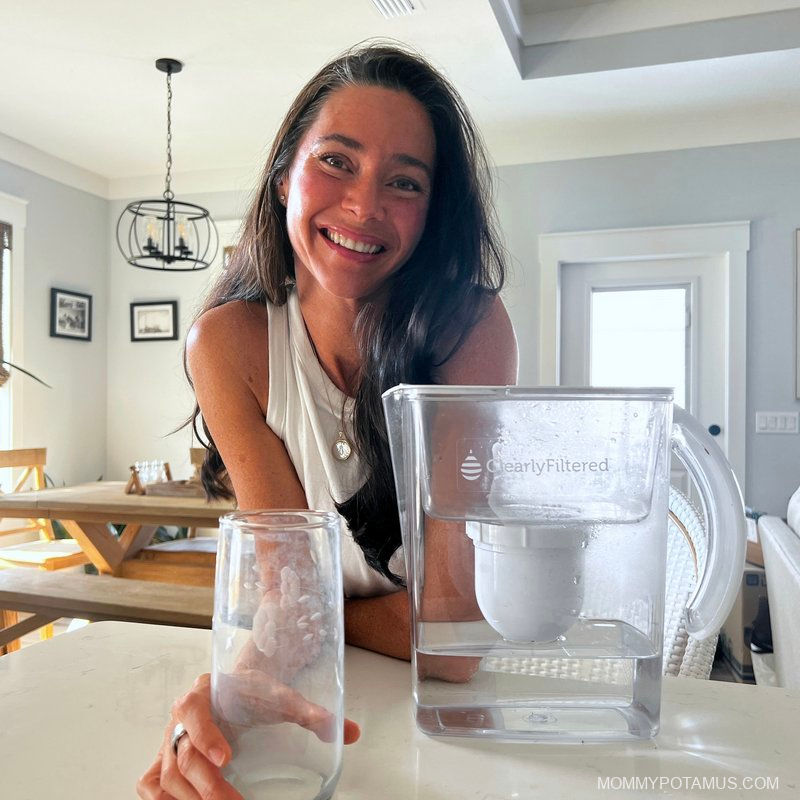
Best Countertop Pitcher: Clearly Filtered ^
Price: $81 (Save 10% with WELCOME10)
This is one of my top recommendations in terms of performance and price. Unlike most pitcher filters which barely do more than improve water taste by removing chlorine, Clearly Filtered says it performs as well or better than reverse osmosis systems . . . all while keeping beneficial minerals intact.
Big claims should come with verifiable data, and Clearly Filtered delivers on that front. All of their products have been independently tested and verified by EPA-accredited laboratories at levels exceeding NSF standards, and they post the results in the top right section of each product listing.
Of all the filters mentioned on this page, Clearly Filtered is certified to remove the most contaminants: 365+ versus 203 claimed (not independently certified) for Berkey and 83 for AquaTru.
I personally bought one of their water pitchers to test (and take on road trips so that my family has access to clean water without buying single-use bottled water) and I can say from experience that it delivers fresh, clean tasting water. My kids will each be getting one of these when they leave my nest (or a larger version if it’s available by then).
Pros
- Independently tested and verified by EPA-accredited laboratories at levels exceeding NSF standards.
- Certified to remove/reduce 365+ contaminants including all types of fluoride additives (sodium fluoride, fluorosilicate and fluorosilicic acid) up to 99.5%, heavy metals, haloacetic acids, microplastics, thorium and cesium, PFAS, pesticides, herbicides, phthalates, VOCs and some pharmaceutical drugs. A link to the full list can be found in the top right corner of the product page.
- Built in the USA with medical-grade materials
- Lifetime guarantee on all filter systems
- Doesn’t remove beneficial minerals from water
- Gravity fed, so no electricity needed
- Doesn’t waste water like reverse osmosis systems
- Can be used in emergency situations.
- Offers subscription to have fresh filters delivered so you don’t have to remember to reorder
- No installation needed
- Filter lasts up to 100 gallons
Cons
- Has to be manually be refilled (But it’s easy since it’s a pitcher)
- Only holds 80 oz, which is 10 cups (They do have two other options that can hook right into your water line, though – a fridge filter that removes 232+ contaminants and an under-sink water filter that doesn’t require you to drill into the counter for installation.)
- No filter change indicator on pitcher (needs to be replaced every 100 gallons)
Filtration Technology Used
Clearly Filtered’s activated carbon filters have a unique structure which forces water to pass through the filtration media at different angles:
twisting and turning on its journey from top to bottom, instead of just passing straight down. This gives water a longer contact time with the media, which allows for a more thorough removal of impurities. Affinity Filtration is more advanced than a typical activated carbon filter as it removes the likes of fluoride and chromium-6, which are commonly found in water and difficult to filter out.”
At the same time, it keeps healthy minerals such as magnesium, potassium, and calcium in.
Where To Buy
Clearly Filtered Website (Save 10% with WELCOME10)
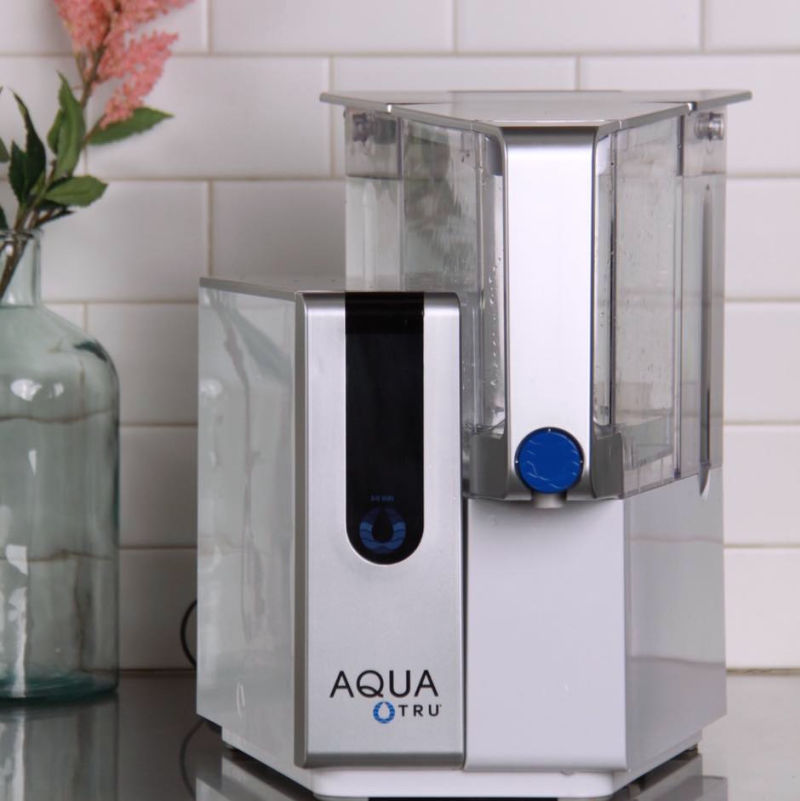
Best Reverse Osmosis System: AquaTru Classic ^
Price: My recommended model, the Classic, is $449 (Save up to $150 herel)
AquaTru is a countertop reverse osmosis filter that is independent lab certified to remove 83 contaminants, including lead, chlorine, radium, nitrates, PFOA and PFOS (two types of PFAS), all types of fluoride additives (sodium fluoride, fluorosilicate and fluorosilicic acid) up to 90%, and more.
Pros
- No installation
- Long-lasting filters that can purify 600-1200 gallons
- Digital display tells you when it’s time to change filters
- Easy to add minerals directly into the clean water reservoir
- Certified by IAPMO Research & Testing to NSF/ANSI standards 42, 53, 58, 401, and P473. Each number refers to testing for a different group of contaminants including heavy metals, Cryptosporidium, VOCs, fluoride and more. Total of 83 contaminants removed/reduced.
Cons
- Reservoir only holds about 3 quarts
- Wastes water (all reverse osmosis systems do)
- Has to be manually refilled
- Wastewater has to be discarded when the reservoir is refilled
- Designed for municipal water, not recommended for well water
- Removes beneficial minerals from water, so you’ll want to add them back in
- Takes up counter space
- Requires electricity
Filtration Technology Used
AquaTru’s 4-stage filtration process uses a pre-filter to remove large particles like sediment and rust, followed by an activated carbon filter to remove chlorine.
After that it runs through a reverse osmosis filter (or membrane) to remove contaminants like lead, arsenic, chromium-6 uranium, nitrates and more, followed by one last pass through an activated coconut carbon block filter to remove compounds like rocket fuel, prescription drug residue, and PFAS.
Where To Buy
Berkey Water Filter Review ^
Price Range: Varies based on size, but about $285 to $400+
The Berkey has been one of the most popular water filters among naturally-minded families for many years, and many of you have asked my opinion on recent controversies related to it.
It’s a gravity-fed filter, which means that you pour water into the top of a reservoir and the water is filtered as gravity pulls it down through the filters.
It runs without any electricity – which can be helpful during power outages or emergency situations – and it comes in several sizes that hold between 1.5 and 6 gallons of water.
However, as I mentioned earlier, it has recently become the subject of criticism. We’ll dive into that below, but first here’s are the basic pros and cons.
Pros:
- Can hold a lot of water depending on which size you choose
- Long filter life
- Relatively affordable
- Can be used in emergency situations.
- Claims to remove/reduce 203 water contaminants including organic compounds like chlorine, heavy metals, inorganic minerals, PFAS Bisphenol-A and pharmaceutical drugs
Cons:
- Although they make some pretty big claims about how their filters exceed NSF (National Sanitation Foundation) standards, there are criticisms of how they conducted their performance tests. For example, to meet NSF-53 standards they would have needed to run 6,000 gallons of water through the filter and then test the water, but one of the labs only used two liters of water before testing.
- Their fluoride filters don’t work as advertised for many people and may actually add aluminum into the water
- They take up counter space
- Have to be manually refilled
- Won’t produce immediate clean water (filtration takes awhile)
- Standing water is vulnerable to bacterial and fungal growth. Even though stainless steel tends to resist microbial growth, my experience is that the entire system needs to be taken apart and thoroughly cleaned regularly to prevent “scum” from forming inside the clean water reservoir.
Filtration Technology Used
Berkey uses two types of filtration media (aka materials) – activated carbon that contains proprietary material and aluminum oxide (also called activated alumina).
Berkey claims that their carbon filters remove chlorine, heavy metals (including lead and arsenic), inorganic minerals, Bisphenol-A and pharmaceutical drugs, but as mentioned above their performance test methods have received some criticism.
They also say their aluminum oxide filters remove up to 97% of fluoride and 99.9% of arsenic. At least some forms of aluminum oxide filtration use ion exchange, which basically means that you’re replacing whatever contaminant was in your water with aluminum oxide. (2) Some manufacturers say that the form of aluminum oxide is relatively safe, but others disagree. More on that below.
Fluoride Removal Problems
There are an increasing number of reports from people (like this one) who have compared their tap water with Berkey-filtered water and found that:
- The amount of fluoride removed is much lower than expected
- The fluoride filters may actually be adding aluminum into the water
Several years ago I personally mailed samples of my tap water and Berkey-filtered water to 3M for analysis. They don’t offer that particular test anymore (it was actually marketed as a way to know if your water had enough fluoride), but according to the results the Berkey reduced the fluoride in my water from .76 PPM to .58 PPM. That’s only about a 24% reduction.
Although I updated my review with that info, we moved soon after that test to a house that did not have fluoridated water so I didn’t look into it more. Unfortunately, it seems that the problem may not just be that the aluminum oxide filters don’t filter all forms of fluoride equally well.
Lab results posted on Facebook along with an explanation of samples taken claim that the activated alumina filters only removed 27% of fluoride while significantly increasing aluminum levels.
I don’t know the individual who ran these tests so I can’t verify the results, but they did I prompt me to do more research about using aluminum in water filtration. I learned that:
- Nano alumina (with particles that are between 50-100 nm) is used in water filtration to remove fluoride (which is what the activated alumina filters are supposed to do). (3)
- According to this study, concerns about “potential adverse health effects have been raised.” Their research suggests that at least some forms of nano aluminum are toxic and can bioaccumulate.
So, does Berkey use nano alumina, and if so which kind? I reached out to ask and was told that:
The PF-2™ Fluoride and Arsenic Reduction Elements includes a high yield aluminum oxide within the media. All other media is proprietary, therefore we do not have information as to the size of the activated alumina within the elements.”
Most water filter companies do keep the exact mix they use as proprietary info to protect it from being used by a competitor, and I get that. For now, though, I have decided to only opt for filters that state they don’t use activated alumina, particularly since it doesn’t seem to filter all forms of fluoride very well.
Alternative To Berkey’s Filters
Recently, Berkey Filters have become unavailable due ongoing litigation and controversy, so customers are looking for alternatives.
Another brand of filters – ProOne – is compatible with the Berkey system. I’ll review them next in this article.
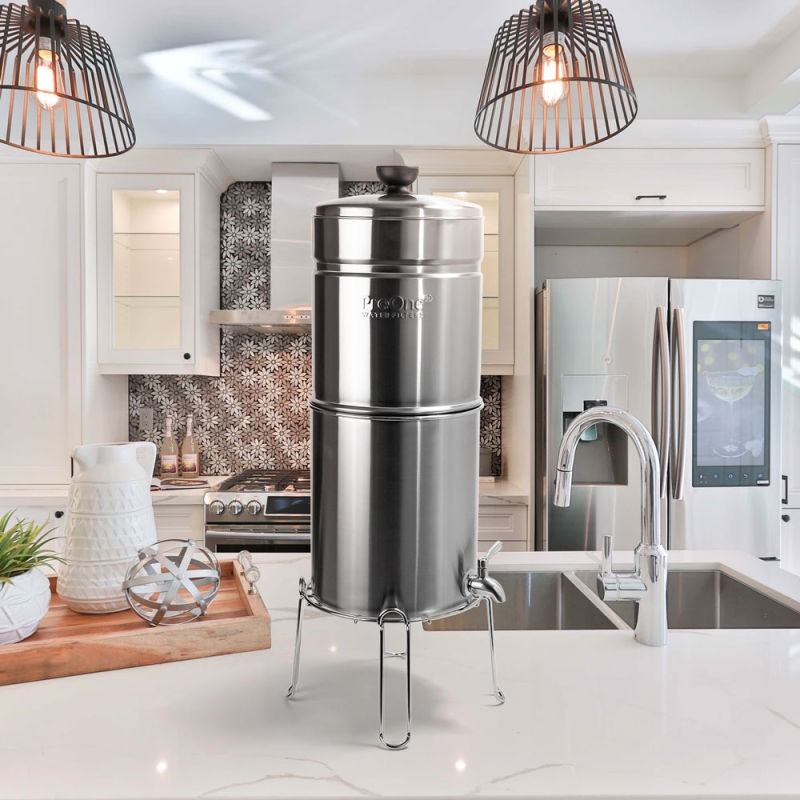
Best Gravity Filter: ProOne (Formerly ProPur) ^
Price Range: Varies based on size, but $199.95 – 364.95
For families that love the Berkey design but want components that have been tested by NSF International – the actual organization that sets the standards everyone is trying to meet – ProOne is the way to go.
They make gravity-fed filters with a variety of capacities, and their fluoride filter is built right into their main filter so you don’t need to buy two. Also, they don’t use aluminum oxide (activated alumina) to filter fluoride.
Pros:
- In addition to having NSF certified components, ProOne has been found by an independent lab to meet NSF/ANSI standards 42, 53, P231, P401 and P473.
- Removes/reduces 200+ contaminants including 1,4 dioxane, microcystin, emerging contaminants, PFOAS (GenX), TTHM’s, bacteria, lead, parasites and more. They also remove two forms of fluoride – sodium fluoride and fluorosilicic acid – but not sodium fluorosilicate. Fortunately, according to the CDC sodium fluorosilicate is typically only used in small water systems, which is pretty much the opposite of large water purification facilities. (4)
- Can hold 2.25-3 gallons of water depending on which size you choose
- Long-lasting filters
- Relatively affordable
- Can be used in emergency situations.
Cons:
- Takes up counter space
- Has to be manually refilled
- Won’t produce immediate clean water (filtration takes awhile)
- Standing water is vulnerable to bacterial and fungal growth, so the unit needs to be cleaned regularly. With that in mind, I like that it comes with a “Gravity Gripper” design that makes it easy to lift the upper container and visually inspect/clean the lower container where the filtered water sits.
Filtration Technology Used
ProOne uses a silver-infused outer ceramic shell to help prevent the growth of bacteria and a proprietary carbon-based granular filtration media inside the core. Their fluoride removal material is included in the main filter, so you don’t have to buy extra filters.
Where To Buy
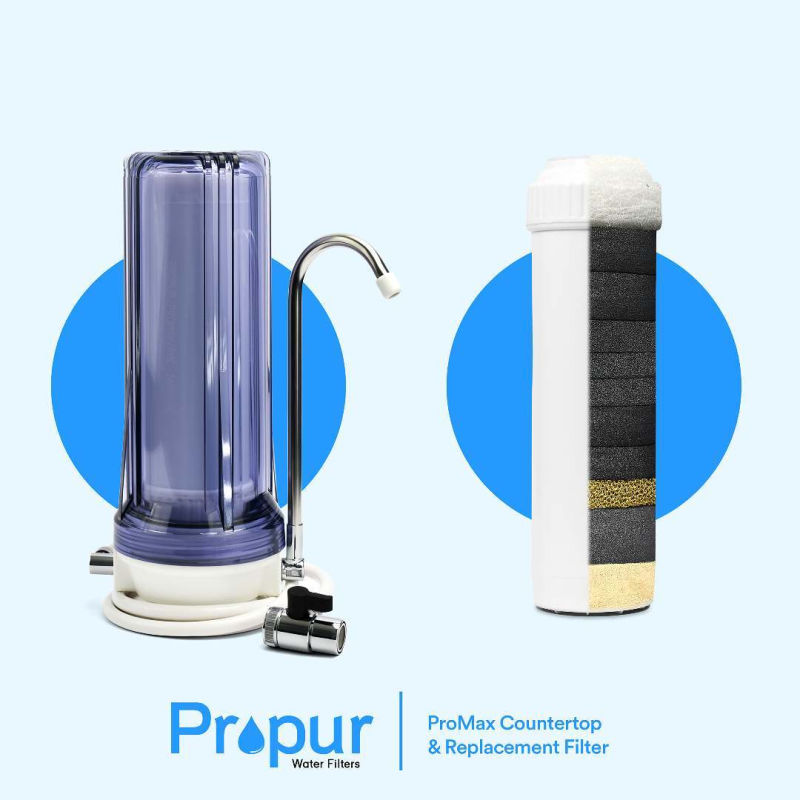
Best Kitchen Faucet Filter: ProMax by ProOne (Formerly ProPur) ^
Price: $189 – 218.95
Unlike the other filters on this page which have to be manually refilled, the ProMax Countertop Filter attaches to a standard faucet and can be installed in just minutes. It’s the only faucet filter I know of that removes fluoride and is independently tested.
It removes/reduces a broad range of over 200 contaminants including VOCs, lead, fluoride (sodium fluoride form only), heavy metals, pesticides, SVC’s, disinfectants, inorganic non-metallics, herbicides, pharmaceuticals, PFOA and PFOS (two types of PFAS), and microplastics. With that said, I only came across this option recently and am not familiar with the filtration technology used. I’ve reached to ProOne for more information and will let you know when I hear back.
Pros
- Tested to NSF/ANSI-42 & 53 standards
- Includes diverter valve allowing you to switch between filtered and direct faucet water
Cons
- Cannot be installed with pull-down faucet
- I’m not familiar with the filtration material used
Filtration Technology Used
Stage 1 includes a 5-Micron standard pre-sediment filter that removes dirt, sand, debris, and rust.
Stage 2 includes ProMaxTM “all-in-one” filter technology, which according to the company is “a highly absorbent filtration material based on infused micro porous foam™ technology. Using different types of water filtration media intended to target specific groups of contaminants staged in layers, ProMaxTM filters are able to absorb a wide range of undesirable contaminants. Contains no resins or beads.”
Where To Buy
You can find the ProMax on the ProOne website.
Another model, the ProOne Coldstream, is also worth considering if you’re not looking for a filter that removes fluoride. It uses different filtration materials – a 2-layer outer ceramic shell that is infused with silver to help prevent the growth of bacteria, and a carbon block core.

ProOne Pitcher Filter Review (Formerly ProPur) ^
Price: $69.95
The ProOne pitcher is very similar to the Clearly Filtered pitcher. Both seem to remove around the same number of contaminants – 257 if I’m counting correctly for ProOne, and 365+ for Clearly Filtered.
The ProOne® G2.0M filter used in the pitcher is NSF/ANSI-42 component certified, and it removes contaminants including fluoride, chlorine, chloramines, VOCs, bacteria, pharmaceuticals, lead & heavy metals, all while leaving in beneficial minerals.
Pros
- Independent lab tested to remove/reduce 200+ contaminants (257 if I counted correctly) including fluoride, chlorine, chloramines, VOCs, bacteria, pharmaceuticals, lead & heavy metals.
- Doesn’t remove beneficial minerals from water
- Gravity fed, so no electricity needed
- Doesn’t waste water like reverse osmosis systems
- Filter element is cleanable and lasts up to 6 months or 225 gallons
- No installation needed
- Filter cartridge lasts up to six months or 225 gallons
Cons
- Has to be manually be refilled (but it’s easy since it’s a pitcher)
- Only holds 54 oz, which is about 6.75 cups
- No filter change indicator on pitcher
Filtration Technology Used
ProOne uses a silver-infused outer ceramic shell to help prevent the growth of bacteria and a proprietary carbon-based granular filtration media inside the core.
Where To Buy
More About Water Filtration ^
Here’s how to find out what contaminants are in your water, and here’s my in-depth guide to choosing the best filter for your specific needs.
Do you have a question about countertop water filter systems?
Please let me know in the comments below!
Want more research-backed natural remedies?
No problem, I’ve created a free ebook for you – Kitchen Apothecary: 25+ Natural Remedies Using Ingredients From Your Pantry – as a gift for signing up for my newsletter. You’ll also get updates when I post about safe essential oils for pregnant/breastfeeding mamas, exclusive gifts and coupons (I was able to give away a jar of free coconut oil to anyone who wanted it recently!), plus other goodies.
Sign up using the form below.
1. Network of reference laboratories, research centres and related organisations for monitoring of emerging environmental substances (NORMAN) Emerging substances
2. Duan, Ying (2014) Fluoride adsorption properties of three modified forms of activated alumina in drinking water
3. Shivaprasad, Parimala (2018) Synthesis of nano alumina for defluoridation of drinking water
4. CDC. Types of Fluoride Additives




